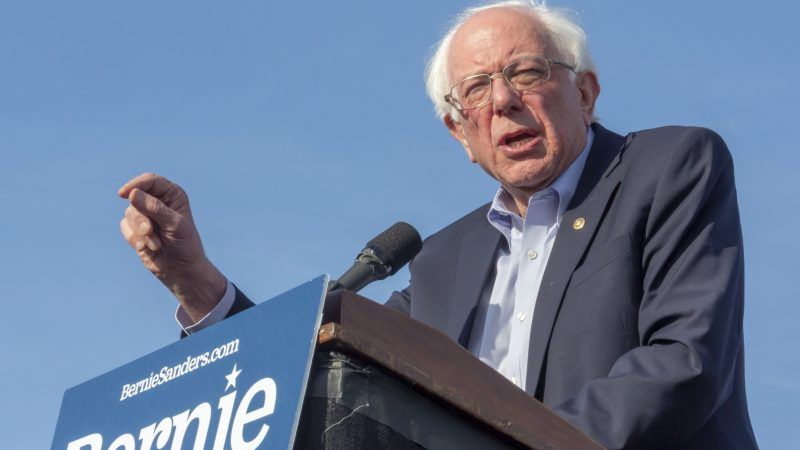Bernie Sanders Is a Millionaire. That's Great!
The democratic socialist gets rich—and makes the argument for capitalism.

If I had a dollar for every time Bernie Sanders has inveighed against "millionaires and billionaires," I'd be…well, still probably not as rich as Bernie Sanders, who revealed last week that he is now a millionaire. Sanders' newfound wealth is due in part to the success of his book, Our Revolution, which earned him roughly $885,000 in 2017 after hitting number three on the New York Times best-seller list, a fact about which Sanders is justly pleased.
"I wrote a best-selling book," he said, explaining how he ended up at the high end of America's wealth spectrum. "If you write a best-selling book, you can be a millionaire, too."
That's right—and that's how it should be.
Sanders spent years building himself and his name into a successful national brand by identifying and filling a relatively unique niche in the market for national politics. Based on the success of that brand, he then negotiated a deal with a publisher to bring a product—his book—to market. The product sold well, and Sanders, who had invested a significant amount of personal time in conceiving and producing the product, reaped the financial rewards. Now he's better off, and I suspect that he, at least, would argue that the people who bought his book are better off too. Everyone wins.
Sanders, in other words, was acting as an entrepreneur, a person who made something new in the world, something for which there turned out to be considerable market demand. And Sanders clearly feels no shame about earning a large return on his labor as a result.
Folks, that's capitalism. Whether he means to or not, Bernie is making an argument for the existence of rich capitalists, and for the value they bring to the world. And it's an argument that both could and should extend beyond book writing to, say, the founders and inventors behind some of the nation's most successful businesses, some of whom have made a lot more than $885,000. If, just for example, you start an online bookstore that eventually revolutionizes the entire retail sector, making it incredibly easy to download Sanders' book to a convenient digital device for just a few bucks, you can be a multi-billionaire too. (Sanders, who blasted Amazon for paying low wages to its distribution center workers, probably made a significant chunk of his book earnings off of Amazon sales.)
But wait a minute—is Sanders really arguing against the existence of millionaires and billionaires? Maybe not explicitly. But by repeatedly singling them out, he was certainly implying that there was something unsavory, something vaguely illegitimate about their existence. And some of Sanders' fellow democratic socialists have certainly suggested that the very existence of a billion-dollar personal fortune is a moral problem, or a "policy failure." (The Sanders brand was, in many ways, first to market. But as with many popular products, his success has led to a legion of imitators.)
Maybe, then, there's a difference between millionaires and billionaires, with the former being a little less objectionable? It's hard to make a coherent argument that there's a clear line at which some amount of wealth suddenly becomes unacceptable—that at some point, you've sold so many books, and made so much money from doing so, that it's immoral.
For Sanders, at least, that line seems to be moving. As the folks at ThinkProgress recently noticed in a video, Sanders appears to have become less focused on millionaires and more interested in the problems with billionaires at the same time his own income increased. Perhaps that's just a coincidence. (Sanders objected to the ThinkProgress video, suggesting it was influenced by corporate money.)
In any case, I think it's genuinely great that Bernie Sanders is a millionaire, and that in becoming a millionaire, our nation's most well-known democratic socialist politician has, however inadvertently, started defending one of the core tenets of capitalism—that if you come up with an idea for a product, make that product a reality in the world, and sell it to lots of willing buyers, it's perfectly just and reasonable for you to earn a lot of money as a result. One can only hope that there are more best-sellers, and more millions, in Sanders' future.


Show Comments (90)